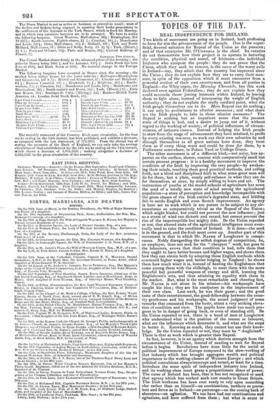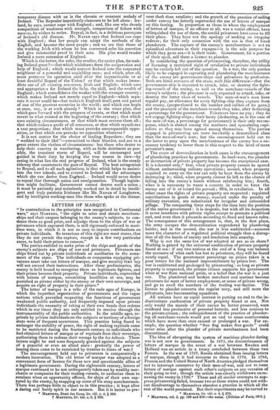TOPICS OF THE DAY.
REAL INDEPENDENCE FOR IRELAND.
Two kinds of movement are going on in Ireland, both professing to have for aim the advancement of the people. One is the super- ficial, fevered agitation for Repeal of the Union as the panacea; and of that enterprise Mr. O'CONNELL is the chief. Its votaries do not demonstrate how their project is to operate in bettering the condition, physical and moral, of Irishmenâthe individual Irishmen who compose the people: they do not prove that the Union, which they seek to remove, is the cause of the worst evils in Irelandânay, they admit that the country has improved since the Union ; they do not explain how they are to carry their mea- sure, in spite of the opposition which it must encounter from a powerful section of their own countrymen, and from all parties in Englandâthe Whig organ, the Morning Chronicle, has this week declared even against Federalism ; they do not explain how they could reconcile those jarring interests within Ireland, by leaving them to fight alone, instead of interposing the weight of English authority ; they do not explain the really cardinal point, what the Irish people themselves are to do. Mere Repeal can do nothing ; it can only be preliminary to ulterior measures ; and what share are the Irish people to take in those ulterior measures? The Repeal is nothing but an impatient sense that the present state of things is bad, and a desire to jump out of it, without regard to the working of society, of political influences, of circum- stances, of intimate causes. Instead of helping the Irish people to start front the stage of advancement they have attained, to profit by every existing resource, to work out their own salvation by and through themselves as all great nations have done, they treat them as if every thing must and could be done for them, by a Parliament somewhere, in Palace Yard or College Green.
The other movement is of a different kind,ânot noisy, less ap- parent on the surface, slower, content with comparatively small but certain present progress : it is a healthy movement to improve the condition of the Irish by improving the very peopleâby awaken- ing their minds, teaching them good practical methods, and calling forth, not a blind and disciplined faith in what some great man will do for them, but a plain, manly self-reliance in what they can do for themselves, at once, by simply willing to learn and act. The instruction of youths at the model-schools of agriculture has sown the seed of a totally new state of mind among the agricultural populationâa state of perception and knowledge incompatible with the gross abuses of the Irish cottier's degraded state, and bidding fair to outdo English and even Scotch improvement. An agency is here set to work which is too potent to be subject to any cir- cumstance so comparatively trivial as the Repeal of the Union; which might hinder, but could not prevent the new influence ; just as a storm of wind can disturb and retard, but cannot prevent the rise of the imperceptible but mighty tide. Be the Union repealed or not, that altered state of the agricultural intelligence must even- tually tend to raise the condition of Ireland. It is doneâthe seed is in the ground, and the fruit must come up. Another part of this movement is that in which Mr. NAPER of Loughcrew is conspi- cuous. Nobly disregarding the selfish dogmas of competition, he, an employer, does not seek for the " cheapest" work, but goes to the labourers, avows that their condition is bad, tells them that they ought to have better houses and higher wages, and shows them how they can obtain both by adopting those English methods which command higher wages and better lodging in England : he shows them how much wiser it is, instead of beating the Englishmen that come among them with the shillelagh, to meet them with the more peaceful but powerful weapons of energy and skill, learning the Englishmen's arts, and thus attaining an equality with them in the market. But, what is the most remarkable and cheering fact, Mr. NAPER is not alone in his missionâhis workpeople have caught his idea ; they are his coadjutors in the improvement of their own class. Last week, be was their guest ; and the good taste of their entertainment, the good-fellowship between the coun- try gentleman and his workpeople, the sound judgment of some remarks that emanated from the hosts, attest a very striking eleva- tion of condition and view. The pupils have made too much pro- gress to be in danger of going back, or even of standing still. Be the Union repealed or not, there is a band of men at Loughcrew who understand what is the position of the tenant or labourer, what are the influences which determine it, and what are the steps to better it. Knowing as much, they cannot but use their know- ledge. Be the Union repealed or not, they must be " Anglicized." There is that at work which is greater than Repeal.
In fact, however, it is an agency which derives strength from the circumstance of the Union, instead of needing to wait for Repeal before it begins. Revolutions have done little for the social or political improvement of Europe compared to the slow-working of that industry which has brought aggregate wealth and political importance to the working-classes of Western Europe ; and which political convulsions always interrupt and retard, at least for a time. Introduce the same spirit of independent industry into Ireland, and its working-class must grasp a proportionate share of power. The curse of Ireland has been, that it has not recognized or used that agency which has worked such vast results in Great Britain. The Irish workman has been ever ready to rely upon something else rather than on himselfâon combinations, nowhere so preva- lent and fierce as in Irelandâon patronageâon the coming back of absenteesâon agitation. We too have had our combinations and agitations, and have suffered from them ; but what is acute or temporary disease with us is the chronic or constant malady of Ireland. The Repealer impatiently clamours to be left alone : Ire- land, he says, cannot cope with England ; and, like one who dreads competition of weakness with strength, comparison of failure with success, he wishes to retire. Repeal, in fact, is a delirious paroxysm of Ireland's old disease. Mr. NAPER says that Ireland can cope with England ; that her people can adopt the methods of the English, and become the same people ; and we see that those of the working Irish with whom he has conversed echo his assertion and give substantial proof in their acts. His plan would render Ireland a mere extension of England.
Which is the better, the safer, the readier, the easier plan, for mak- ing Ireland great ?--that which withdraws from the cooperation and help of England ; which would convert Ireland into the suspected neighbour of a powerful and unyielding race; and which, after all, must postpone its operation until after the impracticable or at least doubtful Repeal of the Union? or that which makes imme- diate use of all existing resources, Irish and English ; which uses and appropriates for Ireland the help, the skill, and the wealth of England; which consolidates the weaker with the stronger country ; which makes Ireland not merely equal to Englandâwhich sepa- rate it never could beâbut makes it England itself, part and parcel of one of the greatest countries in the world ; and which can begin at once, nay, is at work already ? 'Which is the wiser plan, that which goes forward with the progress of events, or that which must revert to what existed at the beginning of the century ; that which uses existing circumstances, or that which must reverse them all ; that which makes a profit of all resources, or that which repudiates a vast proportion ; that which must provoke unconquerable oppo- sition, or that which can provoke no opposition whatever ?
It is not matter for the choice of leading Repeaters; they are 4' wedded to their idol"âcommitted to their blunder, and are to a great extent the victims of circumstances : but those who desire to belp their country in weathering, with as little detriment as pos- sible, the transient storm of Repeal, will be encouraged and guided in their duty by keeping the true course in viewâby seeing in .what lies the real progress of Ireland, what is the steady tideway that counteracts the gust of Repeal. The best antagonism to Repeal, and to all such agitations, is that which helps to assimi- late the two islands, and to extend to Ireland all the advantages which she can derive from Englund.-- Ireland would never desire to repeal that thorough union and amalgamation. Though legisla- tion might facilitate, Government cannot decree such a union ; it must be patiently and noiselessly worked out in detail by intelli- gent and truly patriotic Irishmen like Mr. NAPER of Loughcrew, and by intelligent working-men like those who spoke at the dinner.



























 Previous page
Previous page